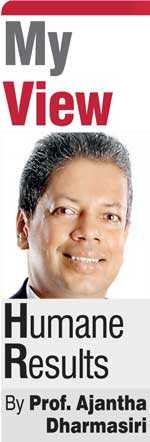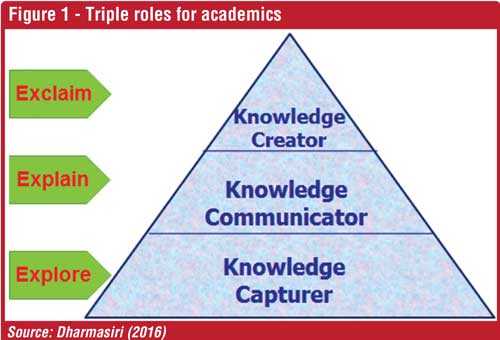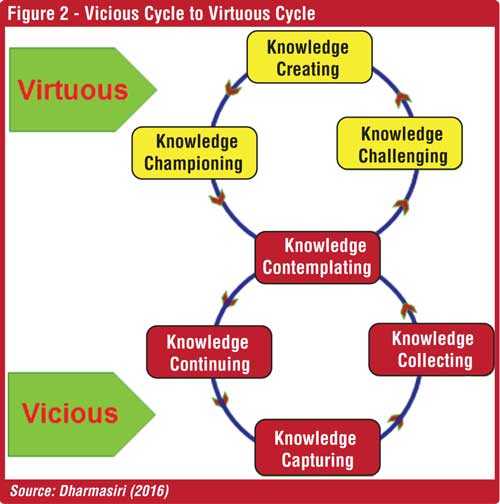Sunday Apr 20, 2025
Sunday Apr 20, 2025
Monday, 25 November 2019 00:00 - - {{hitsCtrl.values.hits}}
We are in the midst of a golden opportunity as a nation to move ahead in solidarity with strategic aims. With refreshing leadership at the helm and renewed enthusiasm for better results in all fronts, it is seen as a positive and progressive beginning of an era of professionalism.
Research plays a key role in such a context where data-driven decisions without fear or favor have to be backed by evidence. Information and intuition both should be involved in such a way forward with insightful action in line with an inspiring vision. Let me highlight the need to reflect reality through research with management and leadership in focus.
Overview
As a continuous learner in management, whilst simultaneously playing multiple roles of a teacher, a researcher, a supervisor and an examiner, my attempt here is to share some relevant thoughts on management research with leadership implications.
“Research is to see what everybody else has seen, and to think what nobody else has thought,” said Albert Szent-Gyorgyi, a Nobel Prize-winning Hungarian psychologist. It is, in fact, developing a third eye to see beyond what is obvious. 
The field of management in Sri Lanka, both private and public sectors alike can immensely benefit if more insights beyond mere information would be the norm in making policy decisions. Management research is of utmost importance, in this sense, globally and locally alike.
Management research is a part of the wider array of social research. As many of us have come across, management research is viewed as “a systematic, data-based, critical, objective, scientific investigation into a specific problem, undertaken with the purpose of finding answers or solutions to it” (Sekaran & Bougie, 2013:2).
Whilst positive initiatives are being taken, current situation with respect to research in Sri Lanka is far from a satisfactory level. Pinikahana (2013) highlighted the need to focus on for private sector to collaborate in university research.
“Sri Lanka contributes only 0.17% from GDP whereas Singapore contributes 2.3%, South Korea, 2.9% and China, 1.3% from their GDP for research. A recent report published by the Ministry of Technology and Research in Sri Lanka revealed that Sri Lanka has only 287 researchers per million which is less than the world average of 894. The average number of researchers per million in the developed world and the developing world is 3272 and 374 respectively. It is clear from these statistics that Sri Lankan situation is worse than the average third world situation. The most alarming situation is that it is getting worse in recent years. For example, in 1996 Sri Lanka had 6,000 full time researchers including university researchers but by 2006 this number declined to 4,200.”(Pinikahana, 2013)
“It is time to deviate from traditional concept of university research and establish some links with the industry, both public and private for collaborative research,” he concludes.
This highlights the need to ‘reach the unreached’ in conducting management research, aptly justifying the theme. In fact, it has a global and local relevance. Bennis and O’Toole (2005) lamented that “too focused on ‘scientific’ research, business schools are hiring professors with limited real-world experience and graduating students who are ill equipped to wrangle with complex, unquantifiable issues in other words, the stuff of management.” It clearly points to the need to have rigour, relevance and reach.
In such a context, any move to strengthen the research rigour, particularly among the University community is commendable. As I observe, there is a clear need to create better awareness on the importance of research. Academics can play a pivotal role here.
Academics as researchers
Academics engage in scholarly activities. They deal with knowledge in playing multiple roles. They have to think and act as knowledge creators as well as knowledge sharers. Academics influence the attitudes and aptitudes of student community. Superiority in scientific thinking, blended with socio-cultural realities is what an academic should smartly possess.
Academics should shift from their perennial plight of ‘publishing or perishing’ to a new paradigm of ‘thought leadership’. Such a transformation requires vision and passion. Overcoming socio-economic as well as religio-cultural barriers in moving ahead with a strong intrinsically-driven motivation is the need of the hour.
Triple roles for academics
The way I see it, academics have triple roles to play. These can be depicted as a knowledge pyramid of academics. Figure 1 depicts the details. 
Academics as knowledge capturers
The bottom of the knowledge pyramid contains the role of knowledge capturer. This includes the learning dimension of an academic. We learn from the womb to the tomb, as life-long learners. I prefer to be called as a management learner than an ‘expert’. This is more relevant in the context of change, where knowledge is rapidly getting obsolete. Particularly, in the areas of Information, Communication and Technology (ICT), the rate of knowledge updating seems more rapid.
This is where the academics have to explore new knowledge. They should have the mindset of exploration. It reminds me of a story that I heard about an elderly professor. He was serving in a residential campus in a European city, staying in the upper-most floor of the building complex. His room was well lit early morning and the students could see him reading. Among the students, they were discussing as to why this veteran still suffers in getting up so early to read. One student had the guts to go and ask from him, as to why he is doing so. The professor gave a profound answer: “I would rather you drink from a flowing fountain than from a stale pond.”
Upon reflecting, I was wondering whether we Sri Lankan academics are more ‘flowing fountains’ or ‘stale ponds’. We might be hurriedly offering recycled knowledge over and over again to cater for ever-increasing lecture demand. Hence, the knowledge capturing dimension suffers and opportunity to review and renew oneself gets neglected.
Academics as knowledge communicators
The middle part of the knowledge pyramid is all about sharing knowledge. It highlights the traditional role of teaching. Communicating knowledge does not necessarily mean lecturing. We at the Postgraduate Institute of Management (PIM), have been practicing, what we call four modes of teaching. They refer to ‘tell, ask, show and do’.
Telling means the typical lecturing. Asking means to engage the learning community by raising questions expecting answers from them. Showing refers to audio-visual interventions such as documentaries, movie extracts, video recordings, internet-based resources such as YouTube, etc. Doing means to get the student community to engage in group discussions. In a typical three-hour ‘session’ (we prefer this as opposed to a lecture), roughly one-third would be telling.
I see clear issues among us, Sri Lankan academics in this respect. Are we loading students with knowledge through one-way communication in making them mere receivers? They would easily resort to ‘parrot technique’ in memorising everything and reproducing at the exam with spelling and grammar errors.
Are we being challenged by the student community sufficiently, in leading to a meaningful interactive discussion? I might be biased here in basing on mostly post-graduate teaching experience. Yet, irrespective of what level an academic has to tackle, an appropriate adaption is always possible.
Academics as knowledge creators
This is where the research comes into the limelight. Sri Lankan academics should reach the pinnacle of knowledge pyramid in becoming knowledge creators. Relevant research with rigour and results is the need of the hour. 
Bartunek et al (2001) highlight that there is a considerable gap between organisational research findings and management practices. As they observe:
“Although volumes have been written about the probable causes and consequences of this gap, surprisingly little empirical evidence exists concerning the various viewpoints. The articles in this forum provide data on the role of academic-practitioner relationships in both generating and disseminating knowledge across boundaries. The contributions of each article are summarised in light of recent theories of knowledge creation, and suggestions are made for increasing the value and relevance of future research to both academics and practitioners.” (Bartunek et al, 2001: 1)
In such a context, any move to strengthen the research rigor, particularly among the University community is commendable. As I observe, there is a clear need to create better awareness on the importance of research. This I see acutely in the field of management.
Moving from a vicious cycle to a virtuous cycle
In moving up in the knowledge pyramid, academics need to move from a viscous cycle to a virtuous cycle. I have attempted to capture both the cycles as depicted in figure 2.
As figure 2 depicts, the bottom is the vicious cycle where an academic gets stranded in capturing, collecting, contemplating and continuing of knowledge. In other words, one gets engrossed in sharing same knowledge over and over without reviewing, reflecting and renewing. I refrain from giving Sri Lankan examples, but I know many among us who experience this situation either knowingly or unknowingly.
The break though occurs when one moves from the vicious cycle to the virtuous cycle. Instead of moving beyond knowledge contemplating to knowledge continuing, the cycle should break with knowledge challenging. That’s the entry to the passage of knowledge creating and knowledge championing.
Let me explain this much-needed move through an example. Rather than pinpointing at others, I would share my experience. When I started teaching Human Resource Management, I diligently adhered to the textbook models, in sharing my experience through them. I could even remember the entire lecture or even several lectures by heart. I was essentially, recycling same knowledge, of course with delivery effort sans intellectual stimulation for me. I realised it is just tutoring and not teaching. I needed to move beyond.
When I started challenging the appropriateness of some of the teaching models to our socio-cultural context, the move from viscous cycle to virtuous cycle began. My research on Strategic Human Resource Management (SHRM) shed new insights to the way we approach people particularly in the humanly rich South Asian context. It gave me more confidence to blend western models with regional and local realities, rather than blindly sharing what the books say (Dharmasiri, 2013).
We need more management researchers who would genuinely add value in broadening our understanding, in turn contributing to individual and institutional development. When such research projects happen, we can look forward to a high impact on economic growth with socio-cultural implications. I refer not only to the success of a research project, but the subsequent benefits to the humanity at large.
Way forward
Management research has a long way to go in ensuring the consistent reaching the unreached. With awareness of the content, and familiarity of the contents, the committed conduct with clarity and coherence is what is required.
Overcoming the barriers and moving from a vicious cycle to a virtuous cycle of knowledge creation will pave way for higher vibrancy of management research in Sri Lanka. It requires reflections and resolutions towards results.
(Prof. Ajantha S. Dharmasiri can be reached through [email protected], [email protected] or www.ajanthadharmasiri.info.)